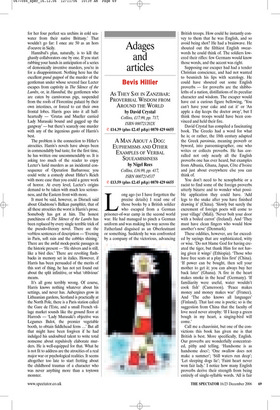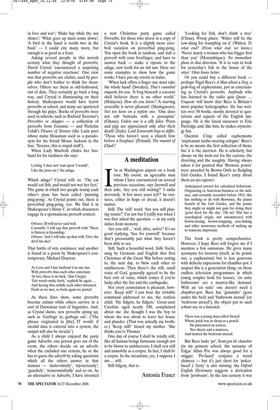Adages and articles
Bevis Hillier
AS THEY SAY IN ZANZIBAR: PROVERBIAL WISDOM FROM AROUND THE WORLD by David Crystal Collins, £17.99, pp. 717, ISBN 000721202X ✆ £14.39 (plus £2.45 p&p) 0870 429 6655 A MAN ABOUT A DOG: EUPHEMISMS AND OTHER EXAMPLES OF VERBAL SQUEAMISHNESS by Nigel Rees Collins, £16.99, pp. 417, ISBN 0007214537 ✆ £13.59 (plus £2.45 p&p) 0870 429 6655 Long ago (so I have forgotten the precise details) I read one of those books by a British soldier who escaped from a German prisoner-of-war camp in the second world war. He had managed to pinch a German uniform and was making his way across the Fatherland disguised as an Oberleutnant or something. Suddenly he was confronted by a company of the victorious, advancing British troops. How could he instantly convey to them that he was English, and so avoid being shot? He had a brainwave. He shouted out the filthiest English swearwords he could think of. The soldiers lowered their rifles: few Germans would know those words, and the accent was right.
Supposing our escaper had had a tender Christian conscience, and had not wanted to besmirch his lips with scatology. He could have shouted out some English proverbs — for proverbs are the shibboleths of a nation, distillations of its peculiar character and wisdom. The escaper would have cut a curious figure bellowing, ‘You can’t have your cake and eat it’ or ‘An apple a day keeps the doctor away’, but I think those troops would have been convinced and held their fire.
David Crystal has compiled a fascinating book. The Greeks had a word for what he is; or rather, the 18th century adapted the Greek paroimia, meaning proverb or byword, into paroemiographer, one who writes or collects proverbs. He has corralled not only nearly all the English proverbs one has ever heard, but examples from Albania, Ghana, Japan, Côte d’Ivoire and just about everywhere else you can think of.
You don’t need to be xenophobic or a racist to find some of the foreign proverbs utterly bizarre and to wonder what possible application they could have. ‘Add legs to the snake after you have finished drawing it’ (China). ‘Slowly but surely the excrement of foreign poets will come to your village’ (Mali). ‘Never bolt your door with a boiled carrot’ (Ireland). And ‘They must have clean fingers who would blow another’s nose’ (Denmark).
These oddities, however, are far exceeded by sayings that are sophisticated, witty or wise. ‘Do not blame God for having created the tiger, but thank Him for not having given it wings’ (Ethiopia). ‘Those who have free seats at a play hiss first’ (China). ‘If power can be bought, then sell your mother to get it; you can always buy her back later’ (Ghana). ‘A fire in the heart makes smoke in the head’ (Germany). ‘If familiarity were useful, water wouldn’t cook fish’ (Cameroon). ‘Peace makes money and money makes war’ (France). And ‘The echo knows all languages’ (Finland). That last one is poetic; so is the suggestion from China that the faculty of love need never atrophy: ‘If I keep a green bough in my heart, a singing-bird will come.’ Call me a chauvinist, but one of the convictions this book has given me is that British is best. More specifically, English. Our proverbs are wonderfully concentrated, pithy and telling. ‘Handsome is as handsome does’; ‘One swallow does not make a summer’; ‘Still waters run deep’; ‘Let sleeping dogs lie’; ‘Faint heart never won fair lady.’ I notice how many English proverbs derive their strength from being entirely of single-syllable words. ‘All is fair in love and war’; ‘Make hay while the sun shines’; ‘What goes up must come down’; ‘A bird in the hand is worth two in the bush’ — I could cite many more, but enough is as good as a feast.
Asking several people in this newish century what they thought of proverbs, David Crystal ‘encountered a surprising number of negative reactions’. One view was that proverbs are clichés, used by people who don’t bother to think for themselves. Others see them as old-fashioned, out of date. They certainly go back a long way, and Crystal is illuminating on their history. Shakespeare would have learnt proverbs at school, and many are spattered through his plays. Books of proverbs were used in schools, such as Richard Taverner’s Proverbes or Adagies — a collection of proverbs from Erasmus — and Nicholas Udall’s Floures of Terence (the Latin poet whose name Housman used as a pseudonym for his friend Moses Jackson in the line, ‘Terence, this is stupid stuff’).
When Lady Macbeth chides her husband for his tardiness she says:
Letting ‘I dare not’ wait upon ‘I would’, Like the poor cat i’ the adage.
Which adage? Crystal tells us: ‘The cat would eat fish, and would not wet her feet.’ The game in which two people trump each other’s puns has been called ‘punning ping-pong’. As Crystal points out, there is proverbial ping-pong, too. We find it in Shakespeare’s Henry V, in which characters engage in a spontaneous proverb contest: Orleans: Ill will never said well.
Constable: I will cap that proverb with ‘There is flattery in friendship.’ Orleans: And I will take up that with ‘Give the devil his due!’ That battle of wits continues; and another is found in a poem by Shakespeare's contemporary, Michael Drayton:
As Love and I late harbour’d in one inn, With proverbs thus each other entertain: ‘In love there is no luck,’ thus I begin; ‘Fair words make fools,’ replieth he again ... And having thus awhile each other thwarted, Fools as we met, so fools again we parted.
As these lines show, some proverbs become extinct while others survive in a sort of Darwinian trait of linguistics. And, as Crystal shows, new proverbs spring up, such as ‘Garbage in, garbage out’. (‘The phrase originated in [the] IT world: if invalid data is entered into a system, the output will also be invalid.’) As a child I always enjoyed the party game Adverbs: one person goes out of the room, the others decide on an adverb; when the excluded one returns, he or she has to guess the adverb by asking questions which all the others answer in that manner — ‘malevolently’, ‘mysteriously’, ‘gauchely’, ‘noncommittally’ and so on. As an alternative to Adverbs, I have invented a new Christmas party game called Proverbs, for those who invest in a copy of Crystal’s book. It is a slightly more cerebral variation on proverbial ping-pong. You open the book at random, and stab a proverb with your forefinger, and have to answer back — make a riposte to the adage, new teeth for an old saw. Here are some examples to show how the game works: I have put my retorts in italics.
‘When luck offers a finger one must take the whole hand’ (Sweden). That’s cannibal etiquette for you. ‘A frog beneath a coconut shell believes there is no other world.’ (Malaysia). How do you know? ‘A starving crocodile is never pleasant’ (Madagascar). Not too keen on a replete one. ‘One does not rub buttocks with a porcupine’ (Ghana). Unless one is a silly fakir. ‘Poets and pigs are appreciated only after their death’ (Italy). Lord Emsworth begs to differ. ‘Those who haven’t seen a church bow before a fireplace’ (Poland). The mantel of Elijah?







































































































































 Previous page
Previous page